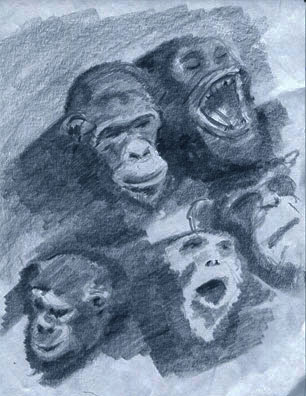
Chimpanzees are considered the closest animal to man. They are in the Hominidae family but are classified as a different genus and species. So the common chimpanzee is the pan troglodytes, a bit harder to remember than the scientific name of the gorilla which is gorilla gorilla. The so-called pygmy chimpanzee - the bonobo - is pan paniscus.
It had long been recognized that we share at least 98 % of the same genes as chimps, and some zoologists say that's good enough for chimps to be in our genus. In fact, in 1775, the year of the Battles of Lexington and Concord, chimps were originally classified as homo. But the anti-chimpanzee crowd got the upper hand, and our simian cousins were banished to their own genus about 40 years later.
Then in 2003 it was reported in the Proceedings of the Natural Academy of Sciences there was 99.4 % nonsynonymous DNA identity between humans and chimpanzees. Also the genetics permits calculation of the evolutionary clock, and it seems that chimps and man separated perhaps as recently as 4 million hears ago - only shortly before the australopithecines emerged in Africa. Since other species with even more distant divergences and less common genetic connections are of the same genus, the case for man and chimpanzees to be lumped together is stronger than ever.
We understand the chimpanzees are deeply insulted and vigorously opposed.
"Implications of natural selection in shaping 99.4% nonsynonymous DNA identity between humans and chimpanzees: Enlarging genus Homo", Derek E. Wildman, Monica Uddin, Guozhen Liu, Lawrence I. Grossman, and Morris Goodman, Proceedings of the National Academy of Sciences, 100 (12), pp. 7181-7188 (2003)
"DNA study supports call to reclassify chimpanzees," Ian Sample, the Guardian, January 23, 2006.